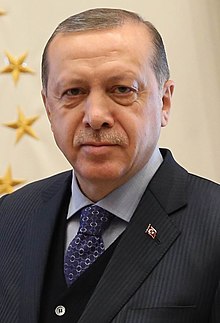Recep T. Erdoğan
|
His Excellency Recep Tayyip Erdoğan |
|
|---|---|
 |
|
| 12th President of Turkey | |
|
Assumed office 28 August 2014 |
|
| Prime Minister |
Ahmet Davutoğlu Binali Yıldırım |
| Preceded by | Abdullah Gül |
| 25th Prime Minister of Turkey | |
|
In office 14 March 2003 – 28 August 2014 |
|
| President | |
| Deputy |
Cabinet II (2007–11)
Cabinet III (2011–14)
|
| Preceded by | Abdullah Gül |
| Succeeded by | Ahmet Davutoğlu |
| Leader of the Justice and Development Party | |
|
Assumed office 21 May 2017 |
|
| Preceded by | Binali Yıldırım |
|
In office 14 August 2001 – 27 August 2014 |
|
| Preceded by | Position established |
| Succeeded by | Ahmet Davutoğlu |
| Mayor of Istanbul | |
|
In office 27 March 1994 – 6 November 1998 |
|
| Preceded by | Nurettin Sözen |
| Succeeded by | Ali Müfit Gürtuna |
| Member of the Grand National Assembly | |
|
In office 9 March 2003 – 28 August 2014 |
|
| Constituency | |
| Personal details | |
| Born |
26 February 1954 Kasımpaşa, Istanbul, Turkey |
| Political party |
|
| Spouse(s) | Emine Gülbaran (m. 1978) |
| Children | |
| Alma mater | Marmara University |
| Signature |  |
| Website |
Government website Personal website |
 |
This article is part of a series about Recep Tayyip Erdoğan |
|---|---|
Parties Elections
|
|
Parties
Elections
Recep Tayyip Erdoğan (Turkish pronunciation: [ɾeˈd͡ʒep tɑjˈjip ˈæɾdo(ɰ)ɑn]; born 26 February 1954) is the current President of Turkey, and has held the position since 2014. He previously served as Prime Minister of Turkey from 2003 to 2014 and as Mayor of Istanbul from 1994 to 1998. He founded the Justice and Development Party (AKP) in 2001, leading it to general election victories in 2002, 2007 and 2011 before standing down upon his election as President in 2014. Coming from an Islamist political background and as a self-described conservative democrat, his administration has overseen social conservative and liberal economic policies, an agenda often referred to as Erdoğanism.
...
Wikipedia


